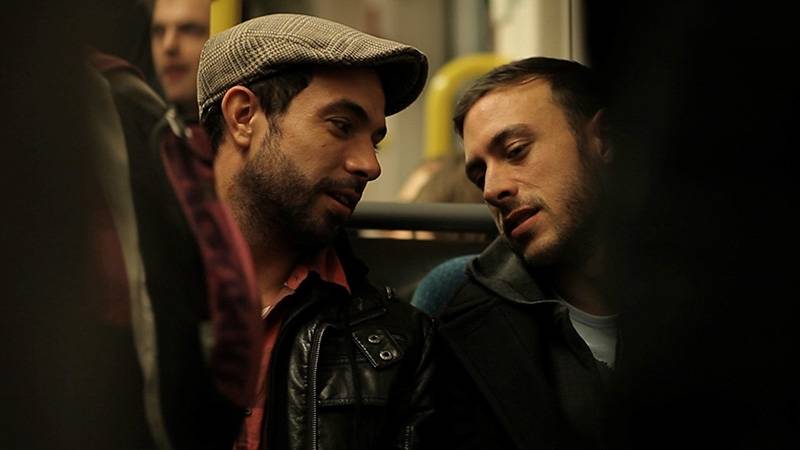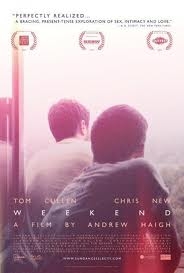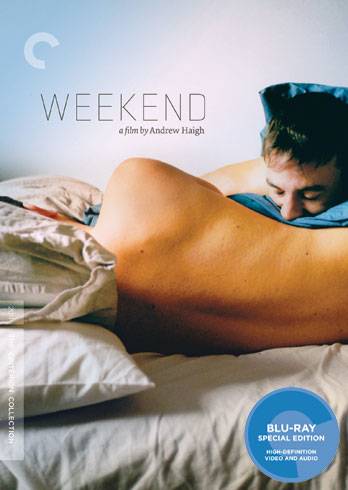
So-called romantic films are almost always god-awful. I have nothing against the notion of romance, nor do I object to its importance as a cinematic trope, but the fact remains that most movies do a disservice to love as a concept and as feeling. Whether the romantic leads fall in love too quickly or are beset by a ridiculous series of improbable obstacles, there is nearly always something patently false about the entire enterprise.
It’s for this reason that, when a film approaches the subject of love with honesty and some resemblance to reality, there is reason to celebrate.
In Andrew Haigh’s thoughtful and painfully real film Weekend, two men meet, connect, and wonder what the hell to do next. The obstacles in front of them are not of the adorable variety. The attraction they feel is neither quirky nor obvious. These are two people, strongly attracted to each other, who discover over the course of a couple of days that there is something between them worth exploring.
 One of the men, Russell, has remained in the closet for the most part, sharing his truth with only his closest friends. As we get to know Russell (played by the ridiculously good-looking Tom Cullen, trying and failing to hide his dark handsomeness under a cap and scruff of beard), we find that he lives a pretty quiet existence. He works a dead-end job by day and hangs out with his straight friends by night before spiriting away to gay bars in the hopes of hooking up. He is not a stereotype of the fearful closeted gay man; rather, he is a man who happens to be gay and is, for practical reasons, emotionally and habitually isolated.
One of the men, Russell, has remained in the closet for the most part, sharing his truth with only his closest friends. As we get to know Russell (played by the ridiculously good-looking Tom Cullen, trying and failing to hide his dark handsomeness under a cap and scruff of beard), we find that he lives a pretty quiet existence. He works a dead-end job by day and hangs out with his straight friends by night before spiriting away to gay bars in the hopes of hooking up. He is not a stereotype of the fearful closeted gay man; rather, he is a man who happens to be gay and is, for practical reasons, emotionally and habitually isolated.
On one of Russell’s late-night excursions, he meets Glen (Chris New), a wiry, talkative artist-type who lives an Out life and likes to discuss, among other things, the way that the media — and films and television in particular — perpetrate a kind of assault on gay life by bombarding people with a constant barrage of heterosexual relationships. This is just one facet of Glen, of course, as neither Glen nor Russell is just one thing. They are each fully realized, authentic characters who behave and speak as real people.
 It is the attention to the manners and speech of real life that gives Weekend its emotional power, I think. In most Hollywood love stories, there would be a misunderstanding over some meaningless personality quirk, then a third of the film would be spent watching the leads fail to communicate honestly while trying to impress each other or pretend they don’t care. In Weekend, during an intense, chemically enhanced late night discussion about why each of the men is frustrated by the outlook of the other, Russell tells Glen, “You want everybody to think independently, but you want everyone to fuckin’ agree with you.” And that, film lovers, is a beautiful thing. That is honesty of a kind you don’t often find in “relationship” movies.
It is the attention to the manners and speech of real life that gives Weekend its emotional power, I think. In most Hollywood love stories, there would be a misunderstanding over some meaningless personality quirk, then a third of the film would be spent watching the leads fail to communicate honestly while trying to impress each other or pretend they don’t care. In Weekend, during an intense, chemically enhanced late night discussion about why each of the men is frustrated by the outlook of the other, Russell tells Glen, “You want everybody to think independently, but you want everyone to fuckin’ agree with you.” And that, film lovers, is a beautiful thing. That is honesty of a kind you don’t often find in “relationship” movies.
The visuals and sound design of the film work in wonderful harmony with the script and acting, creating moments where the audience just manages to see something in the same way that Russell just managed to catch it out of the corner of his eye. The use of the camera to establish a point-of-view, to subtly manipulate the watcher’s gaze, is brilliant and merits repeat viewings. Likewise, the way bits of sound make their way into even the most intimate moments is truly impressive. This is especially true of a scene late in the film, when the men speak at a train station. I won’t provide any spoilers, except to say that Haigh, his actors, and the production team got it right.
Weekend is a lovely film; at times, a sexy film. And yes, I will admit it: It’s a romantic film. This engrossing and moving story shows opening night at the UP Center’s Reel It UP Film Festival at the Art Theater Co-op, and I can say with conviction that it opens strong. Check out our preview for more details on this great event and all of its film entries.








